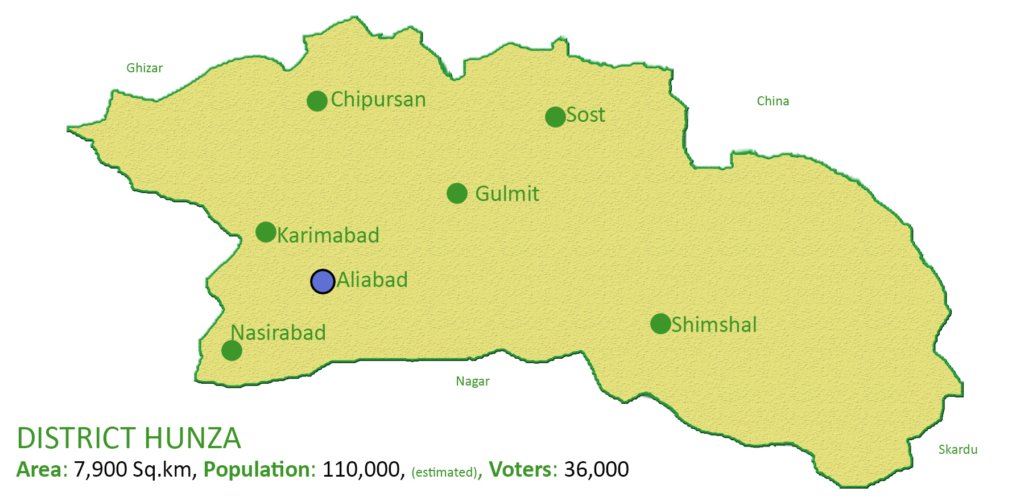The people of Gilgit-Baltistan, especially youth are lately seemed to be engaged in discussions on social media around the recent elections for Gilgit-Baltistan Council. Some are concerned with the transparency aspect of the electoral processes such as partisan-based lobbying, seat adjustment and even allegations of horse-trading (allegedly involving money) whereas others are outrightly disappointed with the voting behaviour of their elected representatives and technocrats for their respective districts. As expected, and as the pattern has been, Pakistan Tehreek Insaaf (PTI), the ruling party in Islamabad and Gilgit-Baltistan, and its allies have won the majority of the seats while ‘regionalism’ prevailed in some districts. What is more concerning is even the educated and otherwise critical lot of the active youth on social media are voicing their concerns without grasping the nature and realities of the Council.
In the light of the recent GB Council elections, the people in Hunza are being divided along ethnolinguistic lines between Central and Upper Hunza or Gojal. A PTI candidate from Hunza belonging to Gojal Raja Shabaz lost the election as he did not get the votes from the elected Minister and the technocrat from Hunza. He has alleged that both have sold their votes whereas, in response to criticism on social media, the technocrat from Hunza Dilshad Bano has given a video explanation saying it was redecided to give votes to PTI candidates from other districts as a gesture of inter-sectarian harmony.
Whatever the case may be, the critics belonging to Gojal have blamed Central Hunza for sidelining candidates from Upper Hunza. This has indeed been an issue with traditional political parties from mainland Pakistan except for the progressive Awami Workers Party that gave tickets to Akhon Bai and Saeed Asif Sakhi in previous elections who received equal support from both the Central and Upper Hunza.
The Gilgit-Baltistan Council was established as an upper house of the regional government under Article 33 of the Gilgit-Baltistan Empowerment and Self Governance Order of 2009 by the PPP-led government in Islamabad. It consists of 15 members with the Prime Minister of Pakistan as its ex-officio chairperson, the governor as its vice-chairman, six federal ministers and members of parliament nominated by the Prime Minister of Pakistan, the Chief Minister of Gilgit-Baltistan and six other members elected by the Gilgit-Baltistan Assembly under a system of proportional representation.
The Federal Minister for Kashmir Affairs and Gilgit-Baltistan attends the council as an ex-officio non-voting member. The council legislates on 55 subjects including most of the financially valuable sectors such as tourism, forestry, minerals and mineral wealth, revenue, customs duty and many vital policy areas such as economic planning.
In addition, the Council oversees the appointments on constitutional positions like the governor, Chief Court judges, Auditor General, Chief Election Commissioner and Chairman of the Public Service Commission. In theory, the elected Assembly is functional, but all the major decisions are taken by the federal government in Islamabad through the Gilgit-Baltistan Council.
The Pakistan Muslim League-Nawaz (PML-N) government towards the end of its tenure in 2018, recommended new political and administrative reforms for GB, announced the annulment of the Gilgit-Baltistan Council. Despite resistance from the opposition and the decision by Supreme Appellant Court, the PML-N government moved Supreme Court against this order and promulgated the GB Order 2018 repealing the GB Empowerment Order 2009 and annulled the powerful GB Council. The sweeping powers of the Council to make legislation on mineral, hydropower and tourism sectors were shifted to Gilgit-Baltistan Legislative Assembly. However, the cabinet, in turn, retained the status of GB Council as an advisory body of the federal government in GB.
The PTI government after coming in power in 2020 in GB under the slogan of giving maximum rights and a province-like or provisional province status to GB. A 12-member committee headed by the Minister for Kashmir and GB Affairs Ali Amin Gandapur was constituted to make recommendations for granting Gilgit-Baltistan the status of a provisional province of Pakistan. The said committee was tasked with making the recommendations keeping in view the United Nations resolutions on the disputed region of Kashmir and a judgment of the Supreme Court of Pakistan on determining the GB status.
Little was done under this committee however in 2021 the GB Council elections were announced by the election commission of GB and 6 members were elected by show of hand in the GBA.
Being a supra-constitutional body chaired by the Prime Minister of Pakistan as its Chairperson, the Council is not directly accountable to the people of Gilgit-Baltistan. There are virtually no checks and balances on the Council’s powers over 55 subjects.
The non-representative character of the Council has been criticized by the people of Gilgit-Baltistan over time. The Council is effectively under the control of the Federal government as 8 out of the 15 members are not elected by the people of Gilgit-Baltistan and 7 are specifically nominated by the Prime Minister of Pakistan.
The extensive powers of the chairman of the Council (the Prime Minister of Pakistan), who has “power to grant pardons, reprieves and respites and to remit, suspend or commute any sentence passed by any court, tribunal or other authority” coupled with the legislative powers on significant matters leaves no room for the elected GBA. The Council strengthens the role of bureaucracy since the Chief Secretary in the Ministry of Kashmir Affairs is a federal bureaucrat and the governor is a political appointee by the President of Pakistan.
Most importantly, this move can be seen as an end to the promises of the current government of making Gilgit-Baltistan a provisional province of Pakistan.
In any case, the broader picture must be considered as the Gilgit-Baltistan Council elections are against the future of Gilgit-Baltistan in becoming a part of Pakistan and the criticism based on ethnic divide will further weaken the case for Hunza which has been left without representation in the previous governments.

Rizwan Qalabadr is an Islamabad-based blogger and activist. He writes on social and political issues on social media and contributes essays to High Asia Herald nad Baam-e-Jahan. He studied Development Administration and Planning at UCL

The High Asia Herald is a member of High Asia Media Group — a window to High Asia and Central Asia

